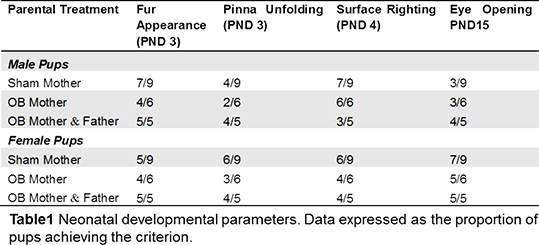| 205P London, UK Pharmacology 2016 |
The effect of olfactory bulbectomy on reproduction and offspring development in the rat
Introduction: It is commonly reported that females are roughly twice as likely to suffer from a depressive disorder compared to males. Depression can often manifest in the perinatal period. Maternal depression has been shown to have significant effects on both the physical and mental health of offspring. The aims of this study were to determine if maternal depression affects litter characteristics and neonatal development of offspring by using a common model of depression, the olfactory bulbectomy model1.
Methods: Olfactory bulbectomy (OB)/sham surgery was carried out on female (n=15/16 per group) Sprague-Dawley rats at 8 weeks old. 5 weeks later they were mated with OB or sham-operated male animals (n=15/14 per group) of comparable strain and age. Litter characteristics were measured at birth and neurodevelopment parameters were examined in the offspring. These parameters included measures of somatic development, i.e. age of fur appearance, pinna infolding and eye opening, and also behavioural development, i.e. surface righting and negative geotaxis reflexes and forelimb grip strength. Data were analysed using Chi Square test or Two-way ANOVA where appropriate.
Results: Less OB dams became pregnant following mating than their sham-operated counterparts (p<0.05). Maternal weight gain was similar between the sham and OB dams mated with sham males, whilst this was significantly reduced in the OB females that had been mated with OB males (p<0.05). Litters born to OB mothers had significantly fewer pups compared to those born to sham mothers, (p<0.001). No differences were observed in the neurodevelopmental parameters measured.

Conclusion: The main finding in this study was that the OB operated mothers, i.e. our models of maternal depression, gave birth to significantly fewer pups compared to control females. The mechanism responsible for this is unclear but it somewhat mirrors what is seen clinically in that maternal depression can affect birth parameters. We did not observe any differences in the neonatal development of the offspring suggesting maternal behaviour towards the offspring was not altered and pups were cared for adequately.
References: Kelly JP et al. (1997). Pharmacol. Ther. 74: 299-316.
Acknowledgement: This work was supported by a College of Medicine postgraduate fellowship, NUI Galway.

